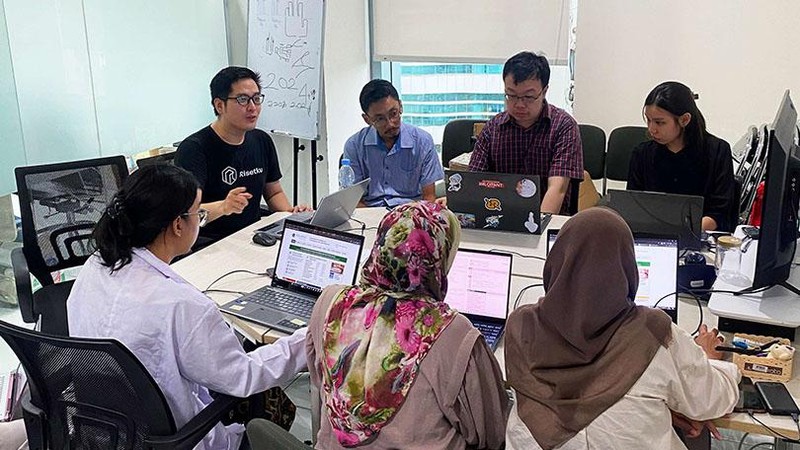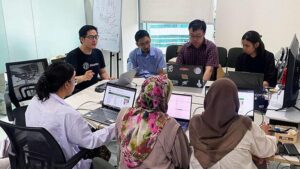

sumodiaper.com, Jakarta – Are you passionate about making a difference in the field of healthcare? Do you want to be at the forefront of medical breakthroughs and advancements? If so, then considering a career in research as a doctor or health worker could be your pathway to shaping the future of medicine. In this blog post, we will explore why doctors and health workers should take on the role of researchers, the benefits it brings not only to their careers but also to patient care, and how they can embark on this exciting journey. Let’s dive in!
Advancement of medical knowledge and treatment options through research
In the ever-evolving field of medicine, research plays a crucial role in advancing medical knowledge and improving treatment options for various health conditions. Through research, doctors and health workers can explore new technologies, medications, and procedures that have the potential to revolutionize patient care.
By conducting studies and clinical trials, researchers can uncover innovative ways to diagnose illnesses earlier, develop more effective treatments with fewer side effects, and ultimately enhance the quality of life for patients. This continuous quest for knowledge drives progress in healthcare by constantly pushing boundaries and challenging traditional approaches.
Moreover, research not only benefits individual patients but also contributes to the collective understanding of diseases on a larger scale. Collaborative efforts among researchers worldwide lead to breakthroughs that benefit populations globally. The exchange of ideas and findings across borders fosters innovation in healthcare practices and ensures that advancements are accessible to all who need them.
Increased job opportunities for doctors and health workers as researchers
Are you a doctor or health worker looking to expand your career horizons? Becoming a researcher could open up a world of new job opportunities for you. In today’s dynamic healthcare landscape, research plays a crucial role in driving innovation and improving patient outcomes. As a researcher, you could work in various settings such as academic institutions, pharmaceutical companies, or government agencies.
By delving into research, you can contribute to the advancement of medical knowledge and help develop cutting-edge treatments and therapies. This not only benefits patients but also enhances your professional growth and expertise. Moreover, being involved in research allows you to stay abreast of the latest developments in your field and collaborate with other experts in the industry.
Embracing a dual role as both a clinician and researcher may pose challenges like time management and workload balance. However, the rewards are significant – from making groundbreaking discoveries to influencing healthcare policies on a global scale. So why limit yourself when there is so much potential waiting for doctors and health workers who choose to become researchers?
Improving patient care through evidence-based practice
Evidence-based practice in healthcare is crucial for ensuring that patients receive the most effective and safe treatments available. By incorporating research findings into clinical decision-making, doctors and health workers can enhance patient outcomes and quality of care. This approach involves critically evaluating the latest studies, guidelines, and data to inform treatment plans tailored to individual patient needs.
When healthcare providers base their decisions on solid evidence rather than tradition or personal beliefs, they can minimize errors, reduce unnecessary interventions, and improve overall patient satisfaction. In essence, evidence-based practice empowers doctors and health workers to deliver care that is not only up-to-date but also grounded in scientific validation. By prioritizing evidence-based practice in their daily work routines, doctors and health workers contribute to a culture of continuous learning and improvement within the medical field.
Challenges and benefits of balancing clinical work with research
Balancing clinical work with research in the medical field can be both challenging and rewarding. Doctors and health workers who take on research roles often find themselves juggling multiple responsibilities, from patient care to data analysis. It requires excellent time management skills and a strong dedication to advancing medical knowledge. One of the main benefits of conducting research alongside clinical duties is the opportunity to contribute to groundbreaking discoveries that can improve patient outcomes. By staying informed about the latest advancements in their field, researchers can directly impact healthcare practices and treatment options.
However, this dual role also comes with its share of challenges. Research projects require meticulous attention to detail and may demand long hours spent analyzing data or writing reports. This additional workload can sometimes lead to burnout if not managed effectively. Despite these obstacles, many doctors and health workers find immense satisfaction in bridging the gap between theory and practice through research efforts. The ability to directly apply new findings from studies into their daily clinical work adds depth and effectiveness to their overall approach towards patient care.
Steps to becoming a successful researcher in the medical field
Are you a doctor or health worker looking to venture into the world of medical research? Here are some key steps to help you become a successful researcher in the field. It’s essential to build a strong foundation by pursuing advanced education in research methodology and biostatistics. Understanding how to design studies and analyze data is crucial for conducting meaningful research.
Next, consider finding a mentor who is an experienced researcher in your area of interest. Learning from someone with expertise can provide valuable guidance and support as you navigate the complexities of conducting research. Additionally, actively seek out opportunities to collaborate with other researchers or participate in ongoing research projects. Networking within the research community can open doors to new partnerships and resources that can enhance your own work.
Furthermore, don’t be afraid to think outside the box and explore innovative ideas that could lead to groundbreaking discoveries. Being creative and open-minded is key to pushing the boundaries of medical knowledge through research. Perseverance is key – success in research often requires dedication, hard work, and resilience in the face of challenges. Stay focused on your goals and keep pushing forward towards making meaningful contributions to the field of medicine through your research efforts.
Conclusion
The medical field greatly benefits from doctors and health workers who become researchers. By engaging in research, professionals can contribute to the advancement of medical knowledge, improve patient care through evidence-based practice, and create new job opportunities for themselves. While there are challenges in balancing clinical work with research, the rewards of making a difference in healthcare make it all worthwhile. As we look towards the future of healthcare in Indonesia and beyond in 2024, encouraging more doctors and health workers to become researchers will undoubtedly lead to better outcomes for patients and advancements in the field as a whole.







